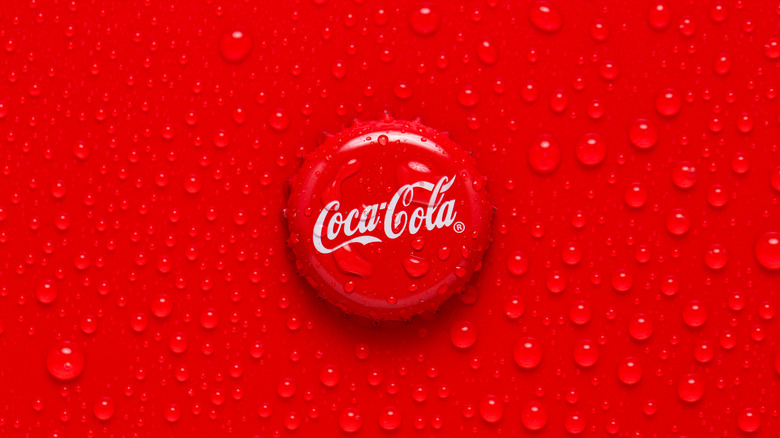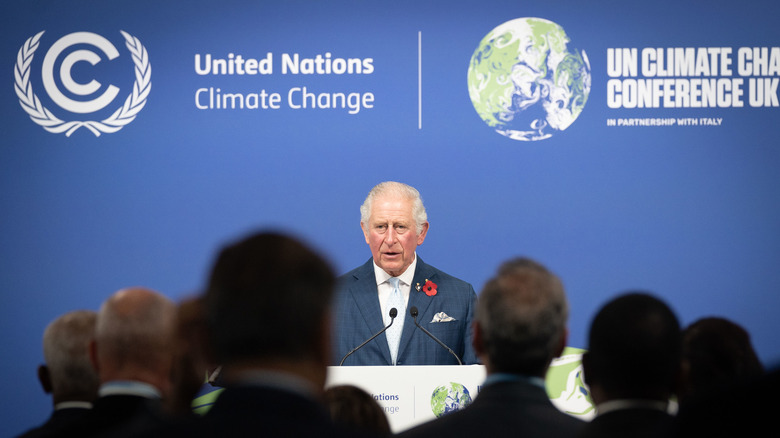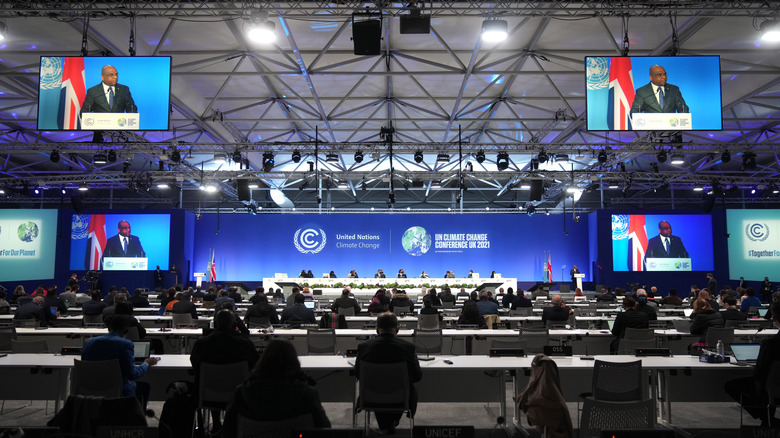The UN Is Receiving Backlash Over Coca-Cola's Sponsorship Of COP27
For the last two decades, the United Nations has held climate change conferences in different parts of the world, and as the UN itself points out, these meetings may have started out as working groups, but they have since become large-scale gatherings per the United Nations Framework Convention on Climate Change (UNFCCC). They've even managed to attract heads of states and governments, royalty, as well as global influencers (via The Scotsman).
Hosting a climate conference like COP — which stands for "Conference of the Parties" is a huge undertaking. In a handout prepared by the UNFCCC, a host country is told it is expected to cover a multitude of costs that include security, the maintenance, and travel of essential staff, as well as the use of a venue that needs to hold as many as 17,000 participants. It comes as no surprise then that UN Climate Change would be on the lookout for partnerships "with entities that demonstrate a willingness to exercise social and environmental responsibility towards global peaking of emissions and enhanced resilience."
But this criteria is precisely why so many climate change activists are both baffled and irate to see that one of the sponsors for COP27, which is being held in Egypt, is Coca-Cola, which they say is one of the biggest polluters and plastic producers in the world, per Associated Press.
Activists see Coca Cola as a global polluter
The Egyptian government's COP27 Secretariat announced Coca-Cola's sponsorship of the UN event by saying that climate was "a key area of focus as The Coca-Cola Company works towards its 2030 Science Based Target of an absolute 25% emissions reduction and its ambition to be net zero carbon globally by 2050," and that "Through the COP27 partnership, the Coca-Cola system aims to continue exploring opportunities to build climate resilience across its business, supply chain and communities, while engaging with other private sector actors, NGOs, and governments to support collective action against climate change."
But environmental activists like New Zealand drinks manufacturer Simon Coley are challenging Coca-Cola's professed green credentials, saying the company produces 120 billion single-use plastic bottles a year, 99% of which are made from fossil fuels, per The Spinoff. In 2019, the BBC even reported that Coca-Cola was "the most polluting brand" in an audit of global plastic waste. And instead of looking to find creative solutions, its Head of Sustainability Bea Perez said they would not stop using these bottles because customers still wanted them. "Business won't be in business if we don't accommodate consumers," she said.
The UN conferences have become a slick marketing campaign: COP attendee
But none of this is surprising to City University of London management professor Bobby Banerjee, who has attended three COP events since 2011 and who believes environmental meetings are just "slick marketing campaigns" for big companies who are now showing up en masse at these events, per the Associated Press. The AP also says corporate presence at climate change conferences is rising since these big groups are seeking ways to profit from climate change.
Environmental activist Georgia Elliott-Smith doesn't think these companies need to be there. She wants to see sponsorships come to an end because their presence isn't necessary and because becoming a sponsor only gives polluting companies a chance to "greenwash their brands." In her Change.org petition calling for Coca-Cola to be removed as a COP27 sponsor, Elliott-Smith accused Coca-Cola of having "a long history of lobbying to delay and derail regulations that would prevent pollution."
Sadly, if Coca-Cola shows up, it wouldn't be the most egregious sponsor in the short history of these UN Climate Change summits. When COP24 took place in Poland in December 2018, its list of corporate sponsors included Tauron Polska, a power generation firm; Polish coal-producing firm JSW; and PGNiG, Poland's leading gas corporation. And while fossil fuel companies were banned from COP26 in Scotland, hundreds of lobbyists linked to the industry were spotted at the event, per AP.


